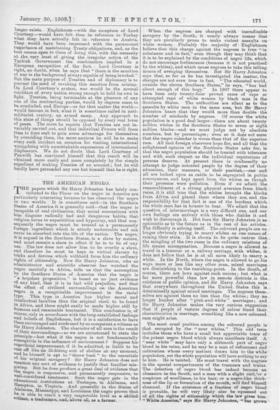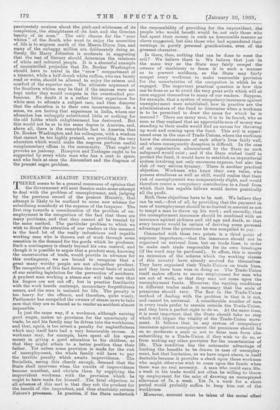THE AMERICAN NEGRO.
TEHE papers which Sir Harry Johnston has lately con- tributed to the 'Times on the negro • in America are particularly interesting because he has observed the negro in two worlds. It is sometimes said—in the Southern States of America it is generally said—that the negro is incapable of real civilisation, that social conventions with him disguise radically bad and dangerous habits, that religion turns to superstition and hypocrisy, and that con- sequently the negro must be treated as a permanently foreign ingredient which is utterly undesirable and can never be absorbed into the life of the nation. The negro, it is argued in the Southern States, is a slave by nature, and must remain a. slave in effect if he is to be of any use. The law does not allow him to be overtly a slave, and therefore he must be kept in virtual slavery by tricks and devices which withhold from him the ordinary rights of citizenship. Now Sir Harry Johnston, who as adiniiiistrator and scientific observer has watched the negro carefully in Africa, tells us that the assumption by the Southern States of America that the negro is "a hopeless proposition" is based on no just evidence O f any kind, that it is in fact wild prejudice, and that the effect of civilised surroundings on the American negro is a recognisable improvement in the racial type. This type in America has higher moral and intellectual faculties than the original stock to be found iU Africa, and these might easily be made higher still by humane and reasonable treatment. This conclusion is, of cOurse, only in accordance with the long-established feelings and beliefs of Englishmen, but it is a satisfaction to have them encouraged and confirmed by so competent a witness as Sir Harry Johnston. The character of all men is the result of their surroundings—so we are accustomed to state the principle—but what if the negro is not fundamentally susceptible to the influence of environment ? Suppose his superfieial improvement, if it be admitted, is liable to be cast off like an ill-fitting suit of clothes at any moment, and he himself is apt to "throw back" to the essentials of his original savagery ? Sir Harry Johnston does not ineution any sort of evidence to justify that familiar mis- Riving. But lie .does produce a great deal of evidence that the negro is responsive, and permanently responsive, to well-considered treatment. Such the negro gets in the educational institutions at Tuskegee, in Alabama, and Hampton, in Virginia. And generally in the States of Alaba. ma, Mississippi, and Louisiana the negro proves that he .is able to reach a very respectable level as a skilled artysan, a traaasuguk, ,aueii, above all, as a farmer. When the negroes are charged with ineradicable savagery by the South, it nearly always means that they are peculiarly prone to make violent assaults on white women. Probably the majority of Englishmen believe that this charge against the negroes is true "in substance and in fact," even though they may think that it is to be explained by the conditions of negro life, which do not encourage forbearance (because it is not practised by the whites), and which cause negroes to take this telling means of avenging themselves. But Sir Harry Johnston says that, so far as he has investigated the matter, the charges are not even true in fact. " The educated world, outside the eleven Southern States," he says, "has had. about enough of this bogy." In 1907 there appear to have been only twenty-four proved cases of rape or attempted rape of white women by black men in the Southern States. The authorities are silent as to the assaults by white men in the same area, but Sir Harry johnston hears that they would more than double the number of misdeeds by negroes. Of course the white population is a good deal larger—there are about twenty million whites in the Southern States to seven or eight million blacks—and we must judge not by absolute numbers, but by percentages ; even so it does not seem that the negro calendar is worse than that of the superior race. All that foreign observers hope for, and all that the ' enlightened opinion of the Northern States asks for, is that the negro population should be treated with tolerance and with such respect as the individual reputations of persons deserve. At present there is confessedly no attempt to judge .coloured people by the degree of their education, their manners, or their position,—one and all are looked upon as cattle to be segregated in public conveyances, and kept apart from the whites as though their presence were pollution. Even if we admit the reasonableness of a strong physical aversion from black races, it is still true that the whites brought the blacks from Africa. and placed them where they are, and the responsibility for that fact is one of the burdens which . the white man has in honour to boar. We admit that the question, of intermarriage is a very difficult one, and our own feelings are entirely with those who dislike it and wish to discourage it. But here Sir Harry Johnston is as optimistic as to the future as in the rest of his articles. The difficulty is solving itself. The coloured people are no longer obviously trying to marry whites as one means of raising their state. It is shown to be quite untrue that , the mingling of the two races in the ordinary relations of life means miscegenation. Because a negro is allowed to travel in a tramcar or a railway carriage with whites, it does not follow that he is at all more likely to marry a. white. In the North, where the negro is allowed to go his ways more or less like any other zna,u, mixed marriages are diminishing to the vanishing-point. In the South, of course, there are laws against such unions ; but what is far more powerful than law in remote districts is the . existence of public opinion, and Sir Harry Johnston says. that everywhere thrmighout the United States this is determinedly against mixed marriages. The Aegroes them- selves are against them no less than the whites ; they no longer hanker after "pink-and-white" marriages; and Sir Harry Johnston makes the very curious suggestion that if people of various degrees of colour blend their characteristics in marriage, something like a new coloured race might arise.
The most cruel position among the coloured people is that occupied by the "near whites." This odd term includes those who have a, small but appreciable trace of the potent negro blood which always manifests itself. A "near white" may have only a sixteenth part of negro blood in his veins, and he may be a man of refinement and cultivation whose every instinct draws him to the white population, yet the white population will have nothing to say to him.. He is tainted. He must travel with the negroes in the special compartments of the tramcars and trains. The detection of negro blood. has indeed become an obsession in the South, and a man with a slight curl,!or a suspicion of woolliness, in his hair, or a negro-like thick. nem of the lip or formation of the mouth, will find himself shunned. If the existence of a fraction of negro blood is provable, he will very likely also be squeezed out of all the rights of eitizenship which the law gives him. "Whit. America," says Sir Harry Johnston, " has rown passionately anxious about the pink-and-whiteness of its • complexion, the straightness of its hair, and the Grecian beauty of its nose." . The only chance for the "near whites" of the South who want to enjoy the ainenities of life is to migrate north of the Mason-Dixon line, and many of the unhappy million are deliberately doing so. Surely Sir Harry Johnston is moderate in suggesting that the test of literacy should determine the relations of white and coloured people. It is a shameful example of uncontrolled prejudice that Dr. Booker Washington should have to travel in the "crow" compartment of a tramcar, while a half-drunk white ruffian, who can barely read or write, should be allowed to enjoy the esteem and comfort of the superior race. The ultimate argument of the Southern whites may be that if the negroes were not kept under they would compete in the overstocked pro- fessions. No doubt it is a rather bitter experience for white men to educate a subject race, and then discover that the education is to their own inconvenience. In a sense, we are having that experience in India, where our education has unhappily substituted little or nothing for the old faiths which enlightenment has destroyed. But this would not be so to the same degree in America, and, above all, there is the remarkable fact in America that Dr. Booker Washington and his colleagues, with a wisdom that cannot be too highly praised, are providing the very education which would make the negroes perform useful complementary offices in the community. That ought to provoke no jealousy. Hampton and Tuskegee ought to be supported by every white man who has a cent to spare, and who feels at once the discomfort and the disgrace of the present negro problem.

























































 Previous page
Previous page